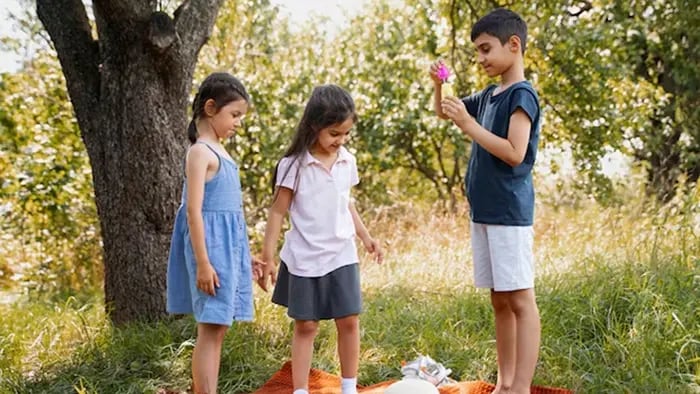- Social Development
- Emotional Development
- Cognitive Development
- Improves Communication Skills
- Cultural and Diversity Awareness
- Life Skills Development

Group activities are all about having fun, surrounded by friends. Kids reach a different level of excitement while working on a group activity, where they share ideas and multitask to complete it. This is why group activities are particularly good for kids; they encourage them to learn new things from others and add new skills.
As the children engage in group activities, they are not just having fun, they are also practicing important motor and cognitive abilities that contribute to overall mental and physical development. However, the benefits of group activities go beyond just individual growth. The interactions and collaborations that take place within the group are equally important. Children have the chance to engage with peers in ways they might not experience otherwise, working together to achieve common goals or simply enjoying each other's company. These social encounters are crucial for developing important life skills, from communication to conflict resolution. Plus, they provide opportunities to make new friends and expand social circles, which can be incredibly valuable for both children and parents.
Group Activity As Life Lesson
Group activities and games can be incredibly valuable learning experiences for children, imparting crucial life lessons that will benefit them for years to come. When kids engage in team-based play, they can develop essential interpersonal skills vital for success in all areas of life. Through cooperation and collaboration with peers, children learn the nuances of navigating social situations and working towards a common goal.
For example, sharing resources, taking turns, and compromising are all skills that come into play during group games. Kids also learn to gracefully handle victory and defeat a humbling but powerful lesson that applies just as much in the classroom or workplace as it does on the playground. Most importantly, group activities teach children the meaning of empathy and compassion. When a teammate is struggling, the most valuable takeaway is learning to offer encouragement and support rather than gloating or shaming. These social-emotional skills are just as crucial as academic knowledge when it comes to becoming a well-rounded, considerate individual.
Benefits of Group Activities for Young Children

1. Social Development
Participating in group activities provides children with opportunities to interact and engage with peers. They learn how to communicate effectively, cooperate, and collaborate with others. Through group activities, children develop essential social skills such as sharing, taking turns, and resolving conflicts.
2. Emotional Development
Group activities also play a significant role in the emotional development of children. They learn to manage emotions, express themselves, and develop a sense of self-awareness. Working together in a group allows children to experience a range of emotions such as joy, frustration, and empathy. It teaches them how to regulate emotions, handle disappointment, and celebrate successes.
3. Cognitive Development

It encourages critical thinking, problem-solving, and decision-making skills. Group activities often involve brainstorming ideas, planning, and executing tasks collaboratively. This fosters creativity, improves communication skills, and promotes active learning. Children learn to listen to different perspectives, think critically, and contribute to group discussions.
4. Improves Communication Skills
Participating in group activities helps children improve communication skills. They learn to articulate thoughts, express themselves clearly, and actively listen to others. Group discussions, debates, and presentations allow children to develop effective communication techniques, including non-verbal cues, active listening, and respectful expression of opinions. These skills are crucial for success in both personal and professional settings.
5. Boosted Self-Confidence
It contributes to the development of children’s self-confidence and self-esteem. By participating in group activities, children gain a sense of achievement when they accomplish tasks or contribute to the group’s success. They learn to trust abilities, take on challenges, and develop a positive self-image.
6. Cultural and Diversity Awareness
Group activities offer a platform for children to interact with peers from diverse backgrounds, cultures, and perspectives. This exposure promotes cultural understanding, empathy, and acceptance. Children learn to appreciate and respect different traditions, beliefs, and customs. Group activities encourage inclusivity and teach children the importance of embracing diversity, fostering a more harmonious and tolerant society.
7. Life Skills Development

Group activities provide a practical setting for children to develop essential life skills. They learn time management, organization, and effective planning. Group projects teach children how to set goals, delegate tasks, and meet deadlines. These activities also nurture problem-solving skills, adaptability, and resilience as children face challenges and find creative solutions together. Group activities play a vital role in the development of children. They contribute to social, emotional, and cognitive growth and enhance communication skills, self-confidence, and cultural awareness. Parents, educators, and community organizations need to provide opportunities for children to engage in group activities, both in and outside of school. By encouraging children to participate in group activities, parents and schools are empowering them to become well-rounded individuals who are capable of collaborating, communicating, and thriving in a diverse and interconnected world.
Tarishi Shrivastava is a young writer who has covered a range of topics on children's health, including nutrition, fitness, sleep, and parent-child bonding. With a keen interest in simplifying wellness for parents, she brings a practical and engaging approach to her writing. Beyond work, she enjoys exploring new ideas, staying curious, and creating meaningful content.
The views expressed are that of the expert alone.
The information provided in this content is for informational purposes only and should not be considered a substitute for professional medical advice, diagnosis, or treatment. Always seek the advice of your physician or another qualified healthcare provider before making any significant changes to your diet, exercise, or medication routines.










